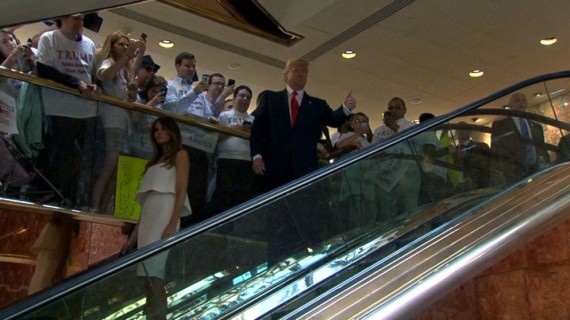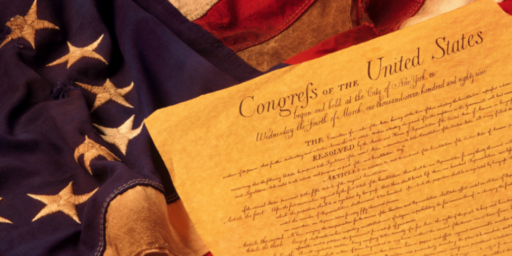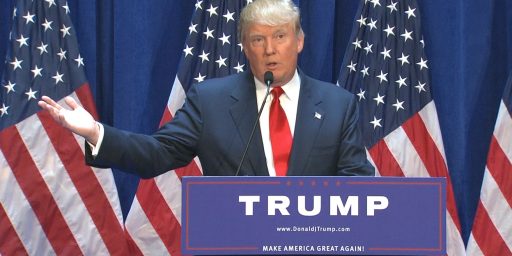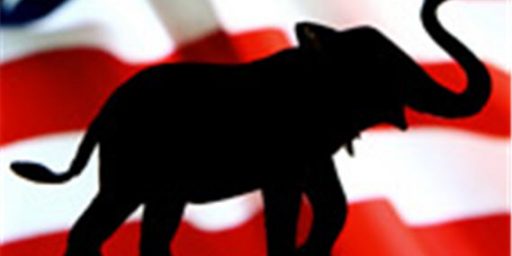Donald Trump Once Again Refusing To Rule Out Running As An Independent
Two months after seemingly promising to remain loyal to the Republican Party, Donald Trump is again refusing to rule out an independent run for the White House next year.
Donald Trump seems to be renewing the threat that he might run as an Independent in next year’s General Election if he isn’t “treated fairly” by Republicans:
Republican presidential frontrunner Donald Trump would not rule out making a run for president as an independent despite signing a pledge over the summer saying he would support the eventual GOP nominee instead of running a third-party bid.
“I’m going to have to see what happens. I will see what happens. I have to be treated fairly,” Trump said Sunday on ABC’s “This Week” when asked about a new guerrilla effort by operatives within the Republican Party to derail Trump’s candidacy. “When I did this, I said I have to be treated fairly. If I’m treated fairly, I’m fine. All I want to do is [have] a level playing field.”
Trump has previously cited “fairness” as a reason he would run a third-party bid. In September, when he signed the pledge, he said he gained nothing besides “assurance that I’ll be treated fairly.”
Trump pointed out that he’s currently content with his position in the polls.
“I’m leading every poll by a lot,” Trump said. “It’s not even a little bit anymore — it’s a lot.”
This remark during Trump’s appearance on The Week yesterday revived an issue that seemed as though it had been resolved in September. As you may recall, back during the first Republican Debate in August, the first question that all the questions were asked was whether they would agree to support the parry’s eventual nominee regardless of who it was and agree not to run as an independent candidate. Since this possibility is something that Trump had hinted at in the early months of his campaign, it was a question that was obviously directed at him and he was the only candidate on the stage that night who would not agree to forego an independent bid. This led Republican Party officials in several states to openly consider requiring candidates who appear on their primary ballot to take a pledge that they would support the nominee of the party and rule out running on the own in the General Election. Ultimately, this effort expanded to the point where the Republican National Committee itself got behind the effort, and pressure mounted on Trump to sign the pledge if he wanted to continue his campaign. Trump ultimately signed the pledge after meeting with RNC Chairman Reince Preibus, a meeting that was followed by, of course a press appearance at Trump Tower that was all about Trump.
At that point, it seemed as though this whole issue of Trump running as an independent was off the table, but Trump’s answer has, at least momentarily, reopened the door. To be fair, it should be noted that Trump was responding to a question asked by George Stephanopoulos and didn’t bring the subject up on his own like he often did during the summer, but the fact that he refused to rule the possibility out rather than simply dismissing it and citing the fact that he signed the pledge is likely to make headlines in any case for several days. To no small degree, of course, this is probably just Trump trolling the media and the Republican Party but the fact that he’s doing it is yet another demonstration of the way that he’s able to control the narrative even at this point in the race.
In reality, there’s very little about this speculation regarding Trump running as an independent, or the supposed pledge that he signed, that really ought to be taken seriously. The fact that Trump signed the oath, in fact, was largely a meaningless act given the fact that there are a host of legal precedents that suggest that such oaths are, at best, legally suspect and largely unenforceable. For example, if Trump does not win the nomination and then subsequently refuses to endorse the eventual party nominee but doesn’t attempt to run as an independent, there’s really very little that the Republican National Committee or anyone else could do to sanction him other than decline to offer him a speaking slot at the Republican National Convention. Indeed, in such a situation it would likely be Trump who would be the one bargaining from a position of strength since the party would probably be eager to get the ratings boost that a Trump speech in Cleveland would bring to the convention itself. Even if Trump did attempt an independent run, though, the pledge itself would have very little impact on his ability to go forward with such a bid.
While the pledge itself would do little to stop an independent run by Trump, there are other factors that would make such a bid unlikely to be very successful even if Trump chose to invest considerable resources into it. Running as an independent, for example, would mean having to get on the ballot in fifty states, plus the District of Columbia, under ballot access laws that, in many cases, place much heavier burdens on independent candidates and candidates from non-major parties. Since the race for the White House is, of course, technically decided by the Electoral College, a Trump independent campaign would also have to put forward names of prospective Electors who would cast a ballot for him were he to actually win, and he have to do that in every state in the nation. This is a tremendous logistical effort, as even Ross Person and the Reform Party that was formed around his 1992 campaign found out more than twenty years ago. Beyond these logistical issues, Trump would also have to deal with the existence of so-called “sore loser” laws that prevent a candidate who lost a primary bid from running for the same office in the General Election as an independent. There are laws like this on the ballot in all but four states, the exceptions are Connecticut, Iowa, New York, and Vermont. What the law considers a “sore loser” varies from state to state, with most states requiring that the candidate have appeared on the primary ballot for the office in question. If they did, then they are barred from running as an independent even if they had ended or suspended their campaign for a party nomination before primary day. Gary Johnson, the Libertarian Party’s nominee in 2012, learned this lesson in Michigan when he was unable to get on the General Election ballot because his name appeared on the Republican Primary ballot earlier in the year even though he had already ended his campaign for the Republican nomination at that point.Trump would face a similar problem, and depending on how many states he actually gets on the ballot in, a true independent bid could end up being an impossibility. Some legal scholars have argued that these “sore loser” laws are unconstitutional, but Johnson failed in a Court bid to succeed in that argument and, in any case, challenging similar laws in many states at once would prove legally daunting even for someone with as much access to legal representation as Trump no doubt has. Election law expert Rick Hasen examined all these issues surrounding a possible Trump independent bid, and a few more, in a piece for The Guardian back in August. For all these reasons, a threat by Trump to run as an independent has always been something of an empty one and, as we get closer to the point where he is likely to actually be on the ballot in primaries, it is essentially becoming an entirely empty threat.






Maybe this is in preparation for asking his supporters to write him in on the ballot. (I don’t know how many states allow write-in candidates.) Certainly his fan club seems to think he’s being treated “unfairly”–whatever that means. I get the sense that anything less than unqualified worship is unfair treatment.
P.S. Answered my own question: 43 states allow write-in candidates for the presidency.
Doug….(shakes head slowly)
You’re being reasonable and logical about this. It’s not going to work. Reasonable and logical is not what people want at present. We’re going to get large headlines from both sides about How Donald Trump Will Run As An Independent. And a lot of screaming from the usual suspects.
Speaking as a Democrat, I certainly hope that Trump runs as an Independent I think he might take 15% along with him, most of it at the expense of the Republican Party. I don’t think he’d be willing to drop tens of millions of dollars to come in 3rd, but … have at it.
Trump is a Republican Party problem in that he is such a narcissist – he simply does play not well with others – it might diminish his personal publicity hounding. It has to be all about Trump. Can you imagine Ted Cruz and Donald Trump trying to work together? Might as well ask Clarence Thomas to speak during Supreme Court oral arguments.
@al-Ameda
A Trump-Cruz pairing is exactly what some of the Trumpets want. Talk about delusional. It’s impossible to imagine these guys sharing a zip code, let alone a ticket.
The only way it would be possible would be if Trump and Cruz struck some sort of deal whereby Trump agreed to be president till he got bored, then resigned and turned the office over to Cruz.
Attention whores don’t stop craving the spotlight just because some silly rules are in place. He WILL be the focus of attention come hell or high water – if not on the ballot, then being the one the nominee needs to crawl to and kiss his ring. Used to be Limbaugh and his ilk that threatened their own if they didn’t get their due. I can see Trump stirring up trouble – “Give me what I want or I have them voting Hillary to spite your RINO ass!”
Doesn’t have to actually run Independent to be a viable Independent campaign threat……
I don’t think this is possible. He’d guarantee a crushing Hillary victory.
I’m pretty sure the universe is structured to prevent something this awesome from happening.
The more likely scenario in my fevered mind is Trump becomes the presumptive nominee and there are elite shenanigans before and at the convention to unseat him. I don’t think Trump will run third-party if he’s defeated in the primaries, but if he wins and the GOP elite refuses to bend the knee we might see it.
I don’t think he’s going to win the primaries, but then I thought a dude who insulted all Mexican immigrants and advocated fascist policy in many areas didn’t have a chance either. The world continues to be strange.
@MikeSJ:
It wouldn’t surprise me. Trump has boasted of how he ordered Hillary to come to his wedding to Melania, and she did. He’s also boasted of buying politicians. He really doesn’t care who becomes president, because he thinks it won’t affect him. Or his money.
I do think that his ego is such that he’d prefer Hillary Clinton to be president, if he’s not the nominee. That would be a nice payback to all the people who wouldn’t vote for him in the general.
The technical diagnosis here I believe is NPD: Narcissistic Personality Disorder. The political diagnosis is a combination of Ross Perot syndrome combined with anticipatory sour grapes syndrome. Either way, obviously, it’s all good news for Hillary and her supporters. The irony would be lost on many if not most of Trump’s addled supporters.
@Bill Lefrak: With the Republican musical chairs and the Democrats lassitude and listlessness, this is an excellent opportunity for independent candidates. We may very well be surprised at who shows up.
I’m the first one to mock Trump, but give him credit: He is arguably the first internet troll to run for a major office, and his reality TV experience has prepared him well for this.
He is doing a masterful job of crafting a cult of personality, having transformed himself into a figure that markets his ego while transcending party affiliation. I doubt that he even wants to president, he’s just having a fantastic time pumping up his inflated head. He will be able to eventually monetize this indirectly with another TV program, book deal, etc., so it will have been money well spent.
I think Trump has definitely damaged the Republican “brand” even more than it already was … who could have imagined that was even possible? Contrary to the view of many Democrats though, I still think Trump would be much more dangerous as the eventual nominee, than if the Republicans are successful in derailing him.
In the world of partisan “team sports” that we live in, I find it much more plausible to imagine many “mainstream” Republicans voting for Trump as the “lesser of two evils” (in their mind) to Hillary Clinton, than seeing Trump supporter not stay home, or vote 3rd party if for instance someone like Jeb Bush (who they hate almost as much, or possibly more than Hillary) is the eventual Republican nominee.
One way or another, I think Trump has probably all but assured that Republicans won’t take back the White House in 2016. I’d just feel a lot more comfortable if by next summer he’s hurting Republicans from the sidelines, without having any chance at all of actually becoming President himself.
@CSK: I had to look it up too, and for the record, the states that do not allow write-ins are the following: South Dakota, Nevada, Oklahoma, Arkansas, Mississippi, Louisiana, and Hawaii. Notice that not one is a swing state.
Isn’t it nice that this lie-spreading dirtbag has a chance to become a major party presidential nominee…